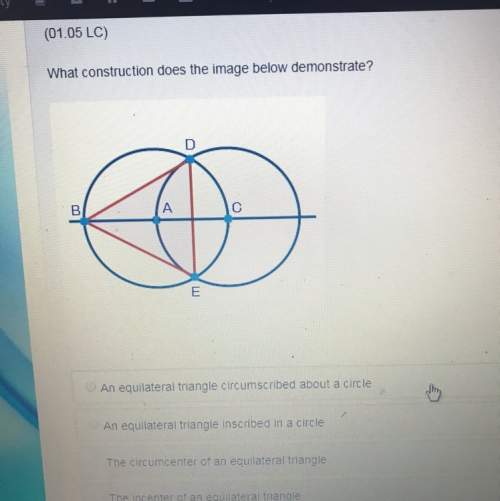
Mathematics, 23.03.2020 18:27 williamvh2001
The weather on any given day in a particular city can be sunny, cloudy, or rainy. It has been observed to be predictable largely on the basis of the weather on the previous day. Specfically: if it is sunny on one day, it will be sunny the next day 1/2 of the time, and be cloudy the next day 1/10 of the time if it is cloudy on one day, it will be sunny the next day 1/10 of the time, and be cloudy the next day 3/10 of the time if it is rainy on one day, it will be sunny the next day 1/5 of the time, and be cloudy the next day 1/2 of the time Using 'sunny', 'cloudy', and 'rainy' (in that order) as the states in a system, set up the transition matrix for a Markov chain to describe this system. Use your matrix to determine the probability that it will rain on Wednesday if it is sunny on Sunday.

Answers: 3


Another question on Mathematics

Mathematics, 20.06.2019 18:04
To prove p is equal to q using an indirect proof what would your starting assumption be?
Answers: 2

Mathematics, 21.06.2019 19:10
How many solutions does the nonlinear system of equations graphed below have?
Answers: 2

Mathematics, 21.06.2019 20:50
These tables represent a quadratic function with a vertex at (0, -1). what is the average rate of change for the interval from x = 9 to x = 10?
Answers: 2

Mathematics, 22.06.2019 00:00
Which statement explains the relationship between corresponding terms in the table?
Answers: 1
You know the right answer?
The weather on any given day in a particular city can be sunny, cloudy, or rainy. It has been observ...
Questions

English, 15.01.2021 01:20


Mathematics, 15.01.2021 01:20

Mathematics, 15.01.2021 01:20



Mathematics, 15.01.2021 01:20

English, 15.01.2021 01:20


Chemistry, 15.01.2021 01:20


History, 15.01.2021 01:20



English, 15.01.2021 01:20

History, 15.01.2021 01:20

Mathematics, 15.01.2021 01:20

Mathematics, 15.01.2021 01:20

Biology, 15.01.2021 01:20




